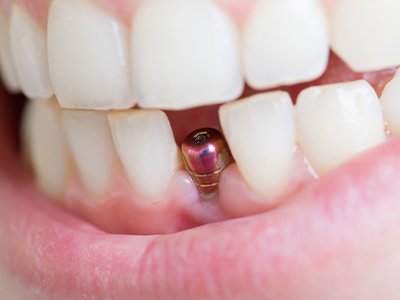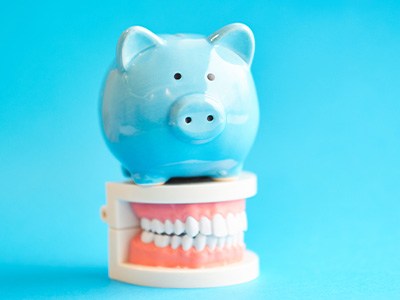Dental Implants – Harker Heights, TX
Replace Your Teeth to the Fullest
The moment a tooth is lost, major changes can start to happen not just with your mouth, but in your day-to-day life. Chewing food becomes more difficult, your words begin to slur, and your confidence decreases as you find yourself hiding your smile. Even worse, your risk for future tooth loss increases. With dental implants from our Harker Heights, TX dentist, there’s a long-term solution for your tooth loss. Call us today to learn if dental implants are right for you!
Why Choose Market Heights Family Dental for Dental Implants?
- Partners with Local Experts Nearby
- Advanced Dental Technology for Better Planning
- Highly Experienced Team Providing Care
What Are Dental Implants?

Dental implants are a form of tooth replacement that consists of three main components: a titanium post, an abutment, and a permanent restoration (single crown, dental bridge, or denture). Since dental implants are surgically attached to the jawbone and integrate with the bone and gums, your tooth replacement feels natural, lasts longer than traditional options, and looks lifelike.
The 4-Step Dental Implant Process

Dental implant treatment takes a few months, but its long-term perks are worth the time and effort. Our practice works with local experts to ensure the posts are well-placed and you get ideal results. In other words, our setup lets you benefit from skilled oral surgeons and their experience. As for the actual care, it’ll involve four steps: consultation, surgery, osseointegration, and delivery of the final restoration. Please keep reading to learn about them or call us for details.
Initial Dental Implant Consultation

Firstly, you’ll meet our dentists for a brief consultation. Doing so lets us learn about your treatment goals, health history, and various other key factors. Using this feedback, we’ll determine whether dental implants suit you and adjust your final procedure(s).
You needn’t panic if we don’t think you qualify for dental implants. To be honest, you can become a good candidate later through extra dental work – gum disease treatment, tooth extractions, etc. Those services (which we could help you arrange) would strengthen your mouth enough for implant posts.
Dental Implant Surgery

Our office refers patients to local specialists for dental implant surgery. Our team takes this approach to ensure the posts are well-placed and don’t cause any major side effects. That way, it should provide you with top-tier results for your smile.
The actual implant surgery will involve several actions. A surgeon will first numb your treatment site, making sure it won’t ache as the work proceeds. They’ll then make a small incision in your gums to create space for the implant post. Once that’s done, they’ll place the implant before suturing your gums shut. Our team will then put a protective cap over the now-set post.
Dental Implant Osseointegration & Abutment

Soon after your surgery, your dental implant will start fusing with your jaw. This process – also called osseointegration – takes 4-6 months and leads to a fully secure tooth. Put another way, it makes your new implant a stable and permanent part of your mouth.
You’ll undergo a follow-up surgery once you’ve healed from implant fusion. For that session, we’ll place your abutment – a metal connector that secures your restoration. A dental lab will craft the final prosthetic while you recover for a few weeks afterward.
Delivery of Dental Implant Restoration(s)

Our dentists will deliver your final restoration at the end of your implant treatment. Overall, this prosthetic should “match up” with how many teeth you have replaced. Depending on your case, it could range from a dental crown or bridge to an actual implant denture.
It shouldn’t take our team long to fit your final restoration. After all, doing so mainly just requires us to apply some dental cement. We’ll then make any needed last-minute changes to ensure the best results, leaving you free to enjoy your restored smile!
Benefits of Dental Implants

Compared to dentures or dental bridges, dental implants have more perks. That’s the main reason the unique posts are considered the gold standard of tooth replacement. After all, patients enjoy their upsides so much that dentists place 500,000 implants yearly. The benefits of dental implants are big enough to be taken very seriously. As for their more specific details, just keep reading or call our office to learn them more thoroughly.
Day-to-Day Benefits

Dental implants’ day-to-day benefits are their most apparent ones. In particular, they include:
- A Gorgeous Smile – Since they’re capped with porcelain, dental implants match your other teeth in size, color, and shape. It’s such that they’ll blend seamlessly with your smile.
- High Confidence – Dental implants should boost your confidence when they restore your smile. In doing so, they’ll make you less anxious about your mouth in social settings.
- Easier Eating – Today’s dental implants fuse with your jaw, restoring your bite’s strength in the process. This effect ensures you can eat tough foods again!
- Low Maintenance – Due to their traits, you can maintain dental implants like natural teeth. Twice-daily brushing and once-daily flossing are enough to keep them clean and functional.
Health Benefits

While their everyday upsides are great, dental implants also have health advantages. These are:
- Tooth Support – Tooth loss becomes more likely when smile gaps go unchecked. Thankfully, dental implants support nearby teeth and keep them from falling out.
- More Jaw Strength – Over time, untreated tooth loss erodes your jaw and weakens its strength. The good news is that dental implants stop (and reverse) such erosion.
- A Cleaner Mouth – Smile gaps left are breeding grounds for bad bacteria, so they make tooth decay and gum disease more likely. That said, dental implants fill those spaces to make your mouth healthier.
- Superior Nutrition – Since they restore your bite, dental implants expand your range of meal choices. This wider field of options ensures you get crucial vitamins and minerals.
Long-term Benefits

Dental implants have great long-term benefits, assuming you give them proper care. Notable among them are:
- High Success Rate – When done by a trained dentist, dental implant treatment almost always succeeds. The procedure’s ten-year success rate is as high as 98%!
- Long-Lasting Results – So long as they’re well placed, dental implants tend to last a long time. An average post has a lifespan of roughly 15-20 years; a well-maintained one can work for more than 30 years!
- Cost-Effective Care – Though they cost more upfront than other options, dental implants save you money in the long run. Their long lifespans (see above) ensure they don’t need costly repair or replacement work.
Who Dental Implants Can Help

Dental implants are designed to be an effective option for replacing single teeth as well as several teeth at a time. In fact, they are often recommended for those with severe tooth loss and who are tired of using traditional dentures. We’ll review your specific needs during your consultation and create a treatment plan from there. Below, you can learn more about what to expect depending on how many teeth you need to replace.
Missing One Tooth

A single implant is placed into the jawbone before osseointegration occurs. An abutment sits in between the implant and crown to ensure long-term stability. By filling the gap, you effectively prevent neighboring teeth from moving out of place as well as maintain their structure.
Missing Multiple Teeth

Implant bridges require a pair of dental implants to hold a restoration. Since the implants are strong enough to hold the restoration, there’s no need to modify existing tooth enamel. Similarly, a partial denture can also be held with a series of dental implants.
Missing All Teeth

Those who are tired of dealing with a standard denture may want to consider an implant denture instead. With roughly four to eight dental implants, you can hold a dedicated restoration designed to replace all teeth in either the top or bottom arch (or both if needed).
Understanding the Cost of Dental Implants

Dental implant treatment is personalized, which means the cost of your care can vary. Until we have a dedicated consultation, we can’t know what your treatment will cost. Certain factors influence your estimate, such as the number of teeth lost, preliminary treatments needed (i.e., bone grafting, gum disease therapy, etc.), and the restoration suggested. We’ll be transparent about your costs upfront and are happy to help you create a plan that fits your budget.
